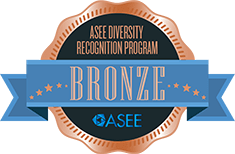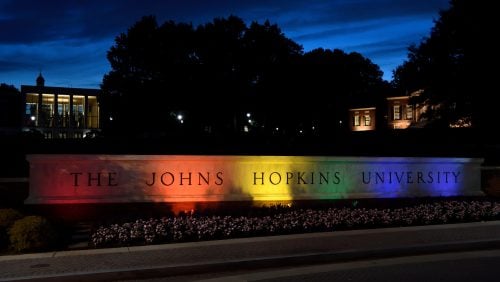“Changing our culture requires us to look critically at ourselves and be honest about what is revealed. It requires our commitment to standing up for racial equality, under any circumstances, and speaking up when we witness behaviors/practices that, whether they are intentional or not, diminish or degrade any group or individual on the basis of their race. ”
JHU Statement of Principles on Diversity, Equity and Inclusion
At Johns Hopkins we strive to be a model of a pluralistic society in which we acknowledge, embrace, and engage diverse identities, perspectives, and experiences. We seek to build and buttress an inclusive intellectual and physical environment to ensure that all members of our community know with certainty that they belong at Johns Hopkins. And we aspire to equitably share the benefits and burdens of dismantling persistent systemic barriers to individual and communal success.
We believe, fundamentally, that every person has equal dignity and worth, and our unwavering commitment to diversity, equity, and inclusion is rooted in this predicate principle. These core values are essential to our university’s academic, research, and public service missions, and bolster our commitment to excellence. Our search for truth and knowledge for the good of humanity depends on bringing the greatest variety of viewpoints and voices to bear on the challenges before us as students, scholars, staff, neighbors, and citizens.
At the intersection of these values is justice. Over the course of history, our nation and university have breached the ideals of justice by discriminating on the basis of race; ethnicity; sex; gender identity and expression; religious belief and observance; disability; socio-economic status; veteran/military status and other factors. We recognize the painful truth that such discrimination has inflicted multigenerational harm and further disenfranchises members of our society. Although our polity and our institution have made meaningful progress, we are by no means past the injury and loss caused by discriminatory practices.
Johns Hopkins assumes its responsibility as a leading research university to work to achieve diversity, equity, and inclusion, and we hold ourselves accountable for our progress through transparency, open communication, and an ongoing, unflinching assessment of met and unmet needs.
WSE Values
The Whiting School of Engineering is a diverse and inclusive community that values:
- A scholarly, collaborative, and entrepreneurial environment in which innovation, creativity, risk-taking, and the ethical practice and applications of engineering and technology are paramount.
- The importance of both of the fundamentals of engineering and the creation and dissemination of transformative knowledge contributing to the betterment of society.
- Its members’ intellectual agility and their capacity to draw upon their wide range of technical and non-technical skills and abilities to solve societal problems.
2019 ASEE Diversity Recognition Program
 The Whiting School of Engineering has been nationally recognized by the American Society for Engineering Education (ASEE) with a Bonze Level award in the inaugural ASEE Diversity Recognition Program. This program was created to publicly recognize those engineering and engineering technology colleges that make significant, measurable progress in increasing the diversity, inclusion, and degree attainment outcomes of their programs.
The Whiting School of Engineering has been nationally recognized by the American Society for Engineering Education (ASEE) with a Bonze Level award in the inaugural ASEE Diversity Recognition Program. This program was created to publicly recognize those engineering and engineering technology colleges that make significant, measurable progress in increasing the diversity, inclusion, and degree attainment outcomes of their programs.
This recognition highlights the Whiting School’s commitment to the following outcomes:
- Establishing support for groups underrepresented in engineering.
- Quantifiably analyzing and assessing unit composition, policies, culture, and climate related to all groups underrepresented in engineering.
- Implementing programs and initiatives that strengthen the K–12 or community college pipeline thereby reducing significant barriers related to long-term growth.
- Developing an action plan focused on continuous improvement.
